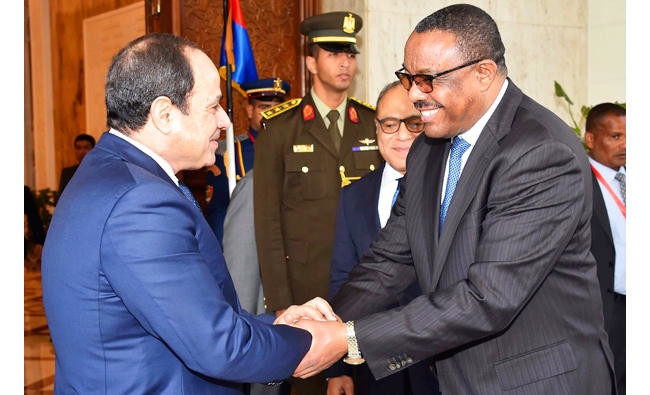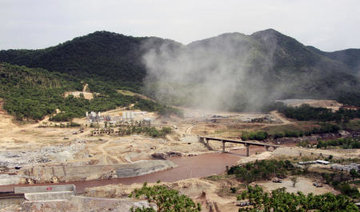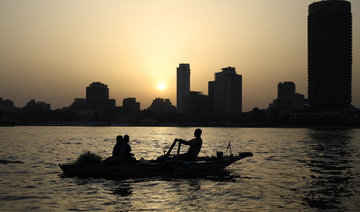CAIRO: Egypt’s president on Thursday expressed his “extreme concern” to Ethiopia’s visiting prime minister over the lack of progress in talks on the impact of a massive upstream dam that Egypt fears could cut into its vital share of the Nile.
President Abdel Fattah El-Sisi has warned that Egypt’s share of the Nile, which provides nearly all its freshwater, is a red line. But he has also sought to reassure Ethiopia and Sudan that Egypt has no intention of going to war.
El-Sisi was grim-faced during most of a news conference he jointly addressed with Prime Minister Hailemariam Desalegn after the two held talks in Cairo.
El-Sisi said he appreciated Ethiopia’s repeated assurances that the dam, which is about 60 percent complete, would not have a negative impact on Egypt, but he said studies must still be completed and that all sides should abide by their findings.
Egypt is a mostly desert country that depends on the Nile for almost all of its water needs. Its 95 million people grow by at least a million every year, further straining its water resources and posing a perpetual challenge to its economic development.
“I expressed our extreme concern over the continuation of the state of stagnation besetting the tripartite technical track,” which is aimed at examining the impact of the dam on Egypt and Sudan, El-Sisi said.
He said cooperation among the Nile basin countries must not be a “zero-sum game.”
Relations have deteriorated between Egypt and Sudan, with Cairo accusing Khartoum of siding with Ethiopia in the dispute over the dam and reviving a long-standing border dispute.
Of special concern to Egypt is the speed at which a planned reservoir is filled behind the dam and the method of its annual replenishment. Egypt fears that a quick fill would drastically reduce the Nile’s flow, with potentially severe effects on its agriculture and other sectors.
Ethiopia says the $5 billion dam is essential, noting that the vast majority of its population lacks electricity. The dam will generate over 6,400 megawatts, a massive boost to the country’s current production of 4,000 Megawatts.
Egypt recently proposed that World Bank experts be brought in as neutral arbitrators. El-Sisi said Sudan and Ethiopia are still studying the proposal, but that Desalegn wanted a different team of experts.
El-Sisi shows ‘extreme concern’ over Nile dam to Ethiopian PM
El-Sisi shows ‘extreme concern’ over Nile dam to Ethiopian PM

WHO chief says he is safe after Sanaa airport bombardment

“One of our plane’s crew members was injured. At least two people were reported killed at the airport,” Tedros Adhanom Ghebreyesus posted on X.
Other UN staff were also safe but their departure was delayed until repairs could be made, he added.
Tedros was in Yemen as part of a mission to seek the release of detained UN staff and assess the health and humanitarian situations in the war-torn country.
He said the mission “concluded today,” and “we continue to call for the detainees’ immediate release.”
While about to board their flight, he said “the airport came under aerial bombardment.”
“The air traffic control tower, the departure lounge — just a few meters from where we were — and the runway were damaged.”
The Israeli air strikes came a day after the latest attacks on Israel by Iran-backed Houthis.
The rebel-held capital’s airport was struck by “more than six” attacks with raids also targeting the adjacent Al-Dailami air base, a witness told AFP.
Israel strikes Yemen’s Sana’a airport, ports and power stations

- Houthis said that multiple air raids targeted an airport, military air base and a power station in Yemen
JERUSALEM: Israel’s military said it struck multiple targets linked to the Iran-aligned Houthi movement in Yemen on Thursday, including Sana’a International Airport and three ports along the western coast.
Attacks hit Yemen’s Hezyaz and Ras Kanatib power stations as well as military infrastructure in the ports of Hodeidah, Salif and Ras Kanatib, Israel’s military added.
The Houthis have repeatedly fired drones and missiles toward Israel in what they describe as acts of solidarity with Palestinians in Gaza.
The Israeli attacks on the airport, Hodeidah and on one power station, were reported by Al Masirah TV, the main television news outlet run by the Houthis.
More than a year of Houthi attacks have disrupted international shipping routes, forcing firms to re-route to longer and more expensive journeys that have in turn stoked fears over global inflation.
Israel has instructed its diplomatic missions in Europe to try to get the Houthis designated as a terrorist organization.
The UN Security Council is due to meet on Monday over Houthi attacks against Israel, Israel’s UN Ambassador Danny Danon said on Wednesday.
On Saturday, Israel’s military failed to intercept a missile from Yemen that fell in the Tel Aviv-Jaffa area, injuring 14 people.
Syria authorities say torched 1 million captagon pills

DAMASCUS: Syria’s new authorities torched a large stockpile of drugs on Wednesday, two security officials told AFP, including one million pills of captagon, whose industrial-scale production flourished under ousted president Bashar Assad.
Captagon is a banned amphetamine-like stimulant that became Syria’s largest export during the country’s more than 13-year civil war, effectively turning it into a narco state under Assad.
“We found a large quantity of captagon, around one million pills,” said a balaclava-wearing member of the security forces, who asked to be identified only by his first name, Osama, and whose khaki uniform bore a “public security” patch.
An AFP journalist saw forces pour fuel over and set fire to a cache of cannabis, the painkiller tramadol, and around 50 bags of pink and yellow captagon pills in a security compound formerly belonging to Assad’s forces in the capital’s Kafr Sousa district.
Captagon has flooded the black market across the region in recent years, with oil-rich Saudi Arabia a major destination.
“The security forces of the new government discovered a drug warehouse as they were inspecting the security quarter,” said another member of the security forces, who identified himself as Hamza.
Authorities destroyed the stocks of alcohol, cannabis, captagon and hashish in order to “protect Syrian society” and “cut off smuggling routes used by Assad family businesses,” he added.
Syria’s new Islamist rulers have yet to spell out their policy on alcohol, which has long been widely available in the country.
Since an Islamist-led rebel alliance toppled Assad on December 8 after a lightning offensive, Syria’s new authorities have said massive quantities of captagon have been found in former government sites around the country, including security branches.
AFP journalists in Syria have seen fighters from Islamist group Hayat Tahrir Al-Sham (HTS) set fire to what they said were stashes of captagon found at facilities once operated by Assad’s forces.
Security force member Hamza confirmed Wednesday that “this is not the first initiative of its kind — the security services, in a number of locations, have found other warehouses... and drug manufacturing sites and destroyed them in the appropriate manner.”
Maher Assad, a military commander and the brother of Bashar Assad, is widely accused of being the power behind the lucrative captagon trade.
Experts believe Syria’s former leader used the threat of drug-fueled unrest to put pressure on Arab governments.
A Saudi delegation met Syria’s new leader Ahmed Al-Sharaa in Damascus on Sunday, a source close to the government told AFP, to discuss the “Syria situation and captagon.”
Jordan in recent years has also cracked down on the smuggling of weapons and drugs including captagon along its 375-kilometer (230-mile) border with Syria.
Jordan says 18,000 Syrians returned home since Assad’s fall

AMMAN: About 18,000 Syrians have crossed into their country from Jordan since the government of Bashar Assad was toppled earlier this month, Jordanian authorities said on Thursday.
Interior Minister Mazen Al-Faraya told state TV channel Al-Mamlaka that “around 18,000 Syrians have returned to their country between the fall of the regime of Bashar Assad on December 8, 2024 until Thursday.”
He said the returnees included 2,300 refugees registered with the United Nations.
Amman says it has hosted about 1.3 million Syrians who fled their country since civil war broke out in 2011, with 650,000 formally registered with the United Nations.
Lebanon hopes for neighborly relations in first message to new Syria government

- Lebanon’s Iran-backed Hezbollah played a major part propping up Syria’s ousted President Bashar Assad through years of war
- Syria’s new Islamist de-facto leader Ahmed Al-Sharaa is seeking to establish relations with Arab and Western leaders
DUBAI: Lebanon said on Thursday it was looking forward to having the best neighborly relations with Syria, in its first official message to the new administration in Damascus.
Lebanese Foreign Minister Abdallah Bou Habib passed the message to his Syrian counterpart, Asaad Hassan Al-Shibani, in a phone call, the Lebanese Foreign Ministry said on X.
Lebanon’s Iran-backed Hezbollah played a major part propping up Syria’s ousted President Bashar Assad through years of war, before bringing its fighters back to Lebanon over the last year to fight in a bruising war with Israel – a redeployment which weakened Syrian government lines.
Under Assad, Hezbollah used Syria to bring in weapons and other military equipment from Iran, through Iraq and Syria and into Lebanon. But on Dec. 6, anti-Assad fighters seized the border with Iraq and cut off that route, and two days later, Islamist militants captured the capital Damascus.
Syria’s new Islamist de-facto leader Ahmed Al-Sharaa is seeking to establish relations with Arab and Western leaders after toppling Assad.















